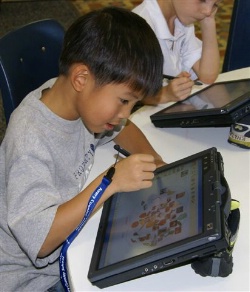There is no global definition of what a gifted student is. In 2011 the National Association for Gifted Children tried to establish what a gifted student is. Gifted, according to them, the term describes individuals who demonstrate outstanding aptitude or  competence in one or more domains.¹ Aptitude is defined as an exceptional ability to learn or reason while competence is defined as documented performance or achievement in the top 10 percent of the population.¹
competence in one or more domains.¹ Aptitude is defined as an exceptional ability to learn or reason while competence is defined as documented performance or achievement in the top 10 percent of the population.¹
Gifted education can be provided in several ways: hobby, enrichment, acceleration, self-pacing, and special schools.
Hobbies are ways that some gifted students expand their education. Activities such as reading, creative writing, sport, computer games, music, and dance are intellectual challenges outside school hours.¹
Enrichment means that students spend normal time in class with their peers but get extra material to challenge them. Enrichment programs may also be organized outside of the school day.¹ A critical argument of enrichment is that it forces gifted students to do more work instead of the same amount just at an advanced level.
Acceleration means that students are moved to higher level classes that are more suited to their abilities and preparedness. This may take the form of skipping grades. Subject acceleration is a method where some subjects are accelerated for a student but not all subjects.¹
Self-pacing methods use flexible grouping practices to allow children to advance at their own pace. An example of a self-paced learning method is the Montessori Method. Self-pacing is not just for gifted students.¹ Self-pacing can help all children learn at accelerated paces.
Some children are educated in separate classes or separate schools. Gifted schools are relatively sparse and often difficult to locate. Some gifted schools offer directed studies while others are led by the class where they choose their own projects, tests, and all other assignments.¹
References:
1. National Association for Gifted Children (2011). Redefining Giftedness for a new Century: Shifting the Paradigm [Position Paper].
Image source: Wikimedia Commons
© BrainMass Inc. brainmass.com June 30, 2024, 10:13 am ad1c9bdddf